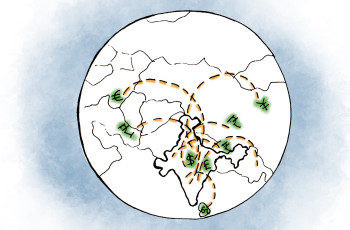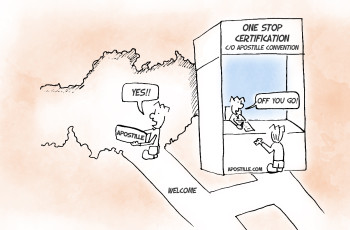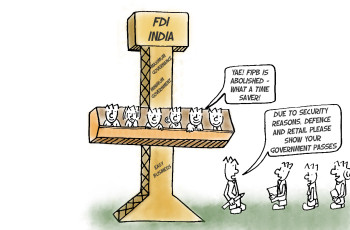FDI in 2016
India is one of the fastest growing economies of the world. The FDI policy reforms are meant to provide ease of doing business and accelerate the pace of foreign investment in India. Foreign companies invest in India to take advantage of relatively lower wages, special investment privileges such as tax exemptions. Foreign investment in a country like India leads to generating employment is the major monetary source for economic development in India. Economic liberalization started in India during 1991 economic crises and since then FDI has steadily increased in India. However, the Government of India has amended FDI policy to increase FDI inflow. The Department of Industrial Policy & Promotion (DIPP) releases the FDI policy. The Policy for the year 2016-2017 has been made effective from the date of its publication i.e 7th June 2016. The FDI reforms include increase in sectoral caps, bringing more activities under the automatic route, opening up of new sectors for FDI, etc.
The following are the key developments in certain specific sectors:
- In Defence Sector foreign investment beyond 49% and up to 100% has been permitted through the government approval route.
- In e-commerce 100% FDI under government approval route for trading including e-commerce, in respect of food products manufactured or produced in India.
- In Pharmaceutical Sector the government has permitted up to 74% FDI under automatic route in existing pharmaceutical ventures. Beyond 74% and up to 100% has been permitted through government approval route. 1
- To boost airport development and modernization 100% FDI in existing airport projects has been allowed without government permission, from 74% permitted so far.
- In Single brand retail local sourcing norms eased for three years and relaxed sourcing regime introduced for 5 years.
- 49% FDI under automatic route permitted in Insurance and Pension sectors.
- FDI up to 100% under automatic route permitted in Teleports, Direct to Home, Cable Networks, Mobile TV, Head end in the sky broadcasting service.
- 100% FDI allowed in Asset Reconstruction Companies (ARC) under the automatic route.
- FDI limit for Private Security Agencies raised to 74%.
- 100% FDI under the automatic approval route is allowed in animal husbandry, pisciculture, aquaculture under controlled conditions. The Government has decided to remove the pre-requisite on “Controlled condition”.
- For establishment of branch office, liaison office or project office or any other place of business in India if the principle business of the applicant is Defence, Telecom, Private Security or Information and Broadcasting, approval of RBI would not be required in cases where FIPB approval or license/permission by the concerned Ministry/Regulator has already been granted. 2
However, FDI continues to be prohibited in lottery, gambling, atomic energy, real estate investments trusts and railway operations.
Government Initiatives:
- The Government of India recently relaxed the FDI policy norms for Non-Resident Indians (NRIs). Under this the non-repatriable investments made by the Persons of Indian Origin (PIOs), Overseas Citizens of India (OCI) and NRIs will be treated as domestic investments and will not be subjected to FDI caps.
- The Government has amended the FDI policy regarding Construction Development Sector. The amended policy includes easing of area restriction/norms, reduction of minimum capitalization and easy exit from the project.
- Also, India is likely to grant Most Favored Nation (MFN) Treatment to 15 countries that are in talks regarding an agreement on the Regional Comprehensive Economic Partnership (RCEP), which would result in significant easing of investment rules for these countries. 3
- However, the Government of India plans to further simplify rules for FDI such as increasing FDI investment limits in sectors and include more sectors in the automatic route, to attract more investments in the country.
Conclusion:
The concept of Make in India has really succeeded as it adds more employment. With this, India has now become a vibrant market for manufacturers. The center has radically liberalized the FDI regime, with the objective of providing major impetus to employment and job creation in India. With all the changes brought in by the Government in the FDI policy for the financial year 2016-2017, India would be one of the most open economy in the world for FDI. Government through a press release dated 20.06.2016 announced its decisions to introduce sweeping reforms to further liberalize the foreign investment regime in India. Corresponding changes to the 2016 FDI policy and RBI regulations are expected to provide clarity on the subject.
Commercial Courts Act, 2015 – A Gargantuan Move!
Inclusion of Foreign Airline Companies within the Companies Act,2013
Leave a comment
You must be logged in to post a comment.









 He holds a Bachelor’s and Master’s Degree in Corporate Secretaryship and a Degree in Law. He is a Fellow member of the Institute of Company Secretaries of India and an Associate Member of the Corporate Governance Institute, UK and Ireland. He has also completed a program from ISB on ‘Value Creation through Mergers and Acquisitions.
He holds a Bachelor’s and Master’s Degree in Corporate Secretaryship and a Degree in Law. He is a Fellow member of the Institute of Company Secretaries of India and an Associate Member of the Corporate Governance Institute, UK and Ireland. He has also completed a program from ISB on ‘Value Creation through Mergers and Acquisitions. Mr P Muthusamy is an Indian Revenue Service (IRS) officer with an outstanding career of 30+ years of experience and expertise in all niche areas of Indirect Taxes covering a wide spectrum including GST, Customs, GATT Valuation, Central Excise and Foreign Trade.
Mr P Muthusamy is an Indian Revenue Service (IRS) officer with an outstanding career of 30+ years of experience and expertise in all niche areas of Indirect Taxes covering a wide spectrum including GST, Customs, GATT Valuation, Central Excise and Foreign Trade. During his judicial role, he heard and decided a large number of cases, including some of the most sensitive, complicated, and high-stake matters on insolvency and bankruptcy, including many cases on resolution plans, shareholder disputes and Schemes of Amalgamation, De-mergers, restructuring etc.,
During his judicial role, he heard and decided a large number of cases, including some of the most sensitive, complicated, and high-stake matters on insolvency and bankruptcy, including many cases on resolution plans, shareholder disputes and Schemes of Amalgamation, De-mergers, restructuring etc., Ms. Sarah Abraham has been enrolled with the Bar Council of Tamil Nadu since 1998. Her areas of practice include Shareholder Disputes, Corporate Compliances, Mergers and Acquisitions, Private Equity/ Venture Capital Agreements and allied disputes, Information Technology Contracts, Intellectual Property, General Commercial Agreements, Litigation, Arbitration and Mediation.
Ms. Sarah Abraham has been enrolled with the Bar Council of Tamil Nadu since 1998. Her areas of practice include Shareholder Disputes, Corporate Compliances, Mergers and Acquisitions, Private Equity/ Venture Capital Agreements and allied disputes, Information Technology Contracts, Intellectual Property, General Commercial Agreements, Litigation, Arbitration and Mediation. A K Mylsamy is the Founder, Managing Partner and the anchor of the firm. He holds a Degree in law and a Degree in Literature. He is enrolled with the Bar Council of Tamil Nadu.
A K Mylsamy is the Founder, Managing Partner and the anchor of the firm. He holds a Degree in law and a Degree in Literature. He is enrolled with the Bar Council of Tamil Nadu. M Subathra holds a Degree in law and a Master’s Degree in International Business Law from the University of Manchester, United Kingdom. She is enrolled with the Bar Council of Tamil Nadu.
M Subathra holds a Degree in law and a Master’s Degree in International Business Law from the University of Manchester, United Kingdom. She is enrolled with the Bar Council of Tamil Nadu. Mr. K Rajendran is a former Indian Revenue Service (IRS) officer with a distinguished service of 35 years in the Indirect Taxation Department with rich experience and expertise in the fields of Customs, Central Excise, Service Tax and GST. He possesses Master’s Degree in English literature. Prior to joining the Department, he served for the All India Radio, Coimbatore for a period of about 4 years.
Mr. K Rajendran is a former Indian Revenue Service (IRS) officer with a distinguished service of 35 years in the Indirect Taxation Department with rich experience and expertise in the fields of Customs, Central Excise, Service Tax and GST. He possesses Master’s Degree in English literature. Prior to joining the Department, he served for the All India Radio, Coimbatore for a period of about 4 years. An MBA from the Indian Institute of Management, Calcutta, and an M.Sc. in Tourism Management from the Scottish Hotel School, UK, Ashok Anantram was one fo the earliest IIM graduates to enter the Indian hospitality industry. He joined India Tourism Development Corporation (ITDC) in 1970 and after a brief stint proceeded to the UK on a scholarship. On his return to India, he joined ITC Hotels Limited in 1975. Over the 30 years in this Organisation, he held senior leadership positions in Sales & Marketing and was its Vice President – Sales & Marketing. He was closely involved in decision making at the corporate level and saw the chain grow from a single hotel in 1975 to a very large multi-brand professional hospitality group.
An MBA from the Indian Institute of Management, Calcutta, and an M.Sc. in Tourism Management from the Scottish Hotel School, UK, Ashok Anantram was one fo the earliest IIM graduates to enter the Indian hospitality industry. He joined India Tourism Development Corporation (ITDC) in 1970 and after a brief stint proceeded to the UK on a scholarship. On his return to India, he joined ITC Hotels Limited in 1975. Over the 30 years in this Organisation, he held senior leadership positions in Sales & Marketing and was its Vice President – Sales & Marketing. He was closely involved in decision making at the corporate level and saw the chain grow from a single hotel in 1975 to a very large multi-brand professional hospitality group. Mani holds a Bachelor Degree in Science and P.G. Diploma in Journalism and Public Relations. He has a rich and varied experience of over 4 decades in Banking, Finance, Hospitality and freelance Journalism. He began his career with Andhra Bank and had the benefit of several training programs in Banking.
Mani holds a Bachelor Degree in Science and P.G. Diploma in Journalism and Public Relations. He has a rich and varied experience of over 4 decades in Banking, Finance, Hospitality and freelance Journalism. He began his career with Andhra Bank and had the benefit of several training programs in Banking. Mr. Kailash Chandra Kala joined the Department of Revenue, Ministry of Finance as ‘Customs Appraiser’ at Mumbai in the year 1993.
Mr. Kailash Chandra Kala joined the Department of Revenue, Ministry of Finance as ‘Customs Appraiser’ at Mumbai in the year 1993.
 S Ramanujam, is a Chartered Accountant with over 40 years of experience and specialization in areas of Corporate Tax, Mergers or Demergers, Restructuring and Acquisitions. He worked as the Executive Vice-President, Group Taxation of the UB Group, Bangalore.
S Ramanujam, is a Chartered Accountant with over 40 years of experience and specialization in areas of Corporate Tax, Mergers or Demergers, Restructuring and Acquisitions. He worked as the Executive Vice-President, Group Taxation of the UB Group, Bangalore. K K Balu holds a degree in B.A and B.L and is a Corporate Lawyer having over 50 years of Legal, Teaching and Judicial experience.
K K Balu holds a degree in B.A and B.L and is a Corporate Lawyer having over 50 years of Legal, Teaching and Judicial experience. Justice M. Jaichandren hails from an illustrious family of lawyers, academics and politicians. Justice Jaichandren majored in criminology and then qualified as a lawyer by securing a gold medal. He successfully practiced in the Madras High Court and appeared in several civil, criminal, consumer, labour, administrative and debt recovery tribunals. He held office as an Advocate for the Government (Writs Side) in Chennai and was on the panel of several government organizations as senior counsel. His true passion lay in practicing Constitutional laws with focus on writs in the Madras High Court. He was appointed Judge, High Court of Madras in December 2005 and retired in February 2017.
Justice M. Jaichandren hails from an illustrious family of lawyers, academics and politicians. Justice Jaichandren majored in criminology and then qualified as a lawyer by securing a gold medal. He successfully practiced in the Madras High Court and appeared in several civil, criminal, consumer, labour, administrative and debt recovery tribunals. He held office as an Advocate for the Government (Writs Side) in Chennai and was on the panel of several government organizations as senior counsel. His true passion lay in practicing Constitutional laws with focus on writs in the Madras High Court. He was appointed Judge, High Court of Madras in December 2005 and retired in February 2017. S Balasubramanian is a Commerce and Law Graduate. He is a member of the Delhi Bar Council, an associate Member of the Institute of Chartered Accountants of India, the Institute of Company Secretaries of India and Management Accountants of India.
S Balasubramanian is a Commerce and Law Graduate. He is a member of the Delhi Bar Council, an associate Member of the Institute of Chartered Accountants of India, the Institute of Company Secretaries of India and Management Accountants of India.